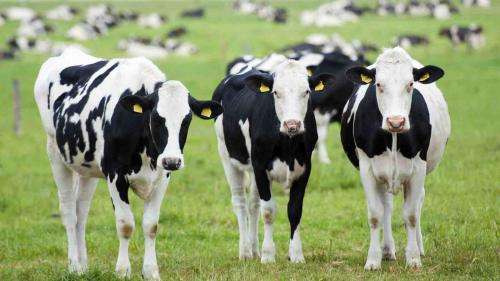Research to enhance fertility of New Zealand dairy cows

An expert in the field of reproductive biology, Dr Janet Pitman from Victoria's School of Biological Sciences, says dairy cows worldwide have become less fertile—partly due to farmers selecting cows for high yields of milk. "This creates a population of cows that use much of their energy to produce milk, with the consequence that less energy is directed towards fertility."
Dr Pitman says the amount of energy a dairy cow uses to produce milk each day is equivalent to completing a mountainous portion of the Tour de France cycle race. "What we are asking cows to do in a conventional New Zealand pastoral-based system is demanding, so it's not surprising that fertility suffers," she says.
Dr Pitman heads the University's involvement in the $40 million, seven-year programme led by DairyNZ, co-funded by DairyNZ and the Ministry of Business, Innovation and Employment and aligned with core science funding from AgResearch. There are multiple collaborative partners involved.
Victoria's role is to recreate the natural fertility environment in the laboratory. "We will then be able to immerse cow eggs in these artificial conditions and treat them with factors they might be exposed to during lactation, to see how well they cope.
"Measuring the differences in the eggs exposed to the different environments will help provide indicators of infertility in dairy cows," says Dr Pitman "and may help design better diets."
Previous research involving the same Victoria University group working in collaboration with University of Queensland, DairyNZ, University of Auckland, AgResearch and Cognosco showed that in early lactating dairy cows, approximately 21 to 42 days after calving, the follicular fluid in which the egg is found is very low in amino acids—as opposed to dairy cows that are not lactating.
"We found that eggs exposed to very low amino acid environments were quite fragile and couldn't cope with the presence of additional stressors, such as non-esterified fatty acids and low cholesterol levels."
In this body of research, Dr Pitman is trying to find a way around that. "We're thinking about what we can feed to dairy cows that may help increase the amino acid composition in the follicular fluid and allow the egg to better cope with other stressors."
Provided by Victoria University of Wellington


















